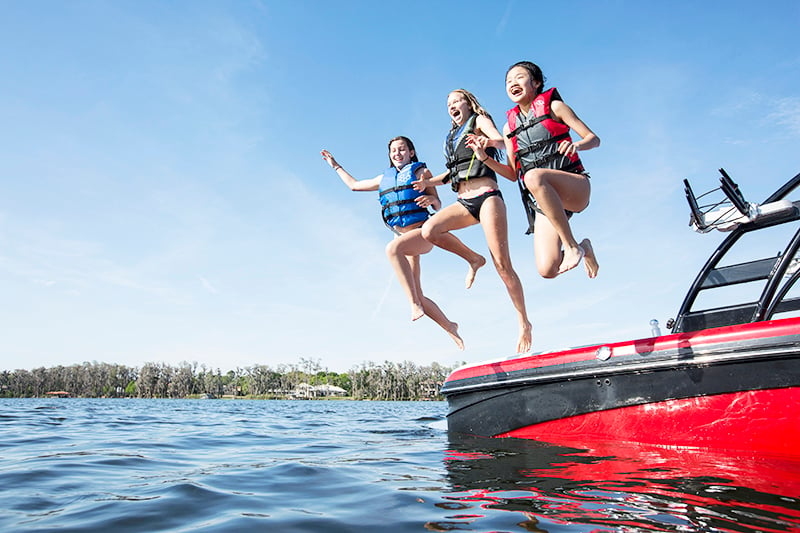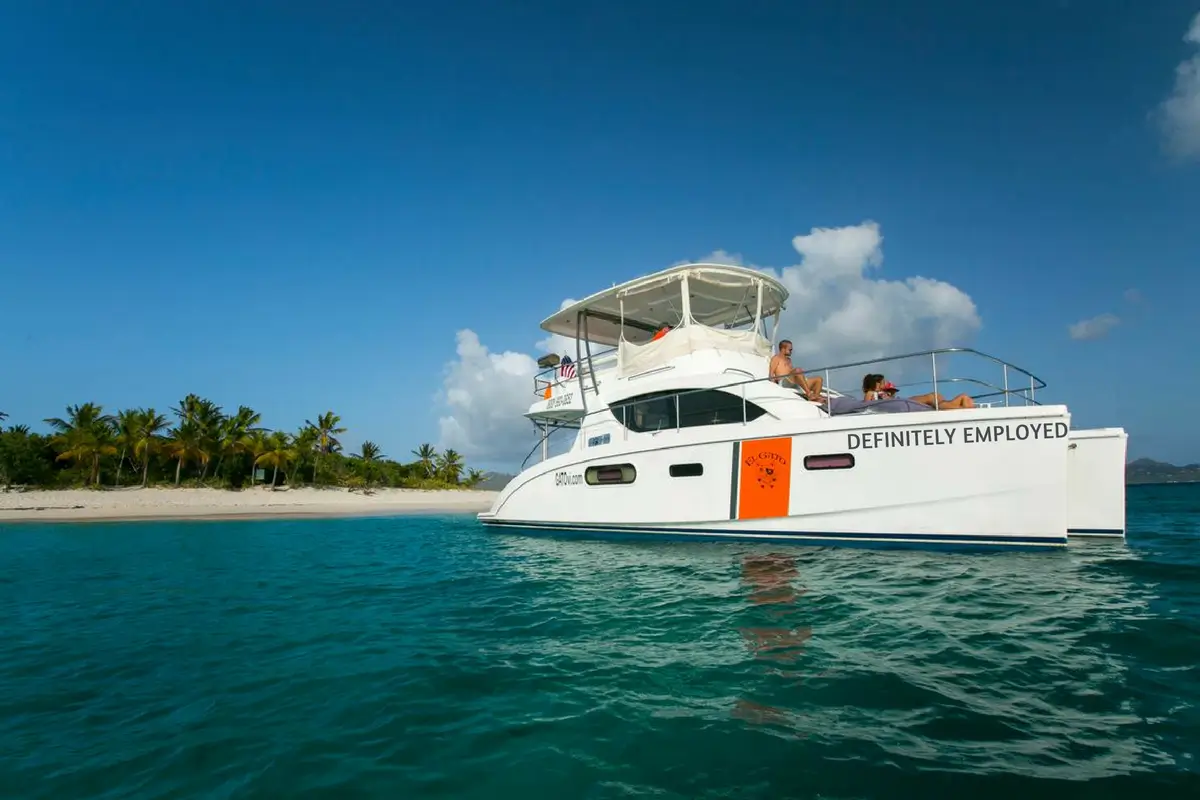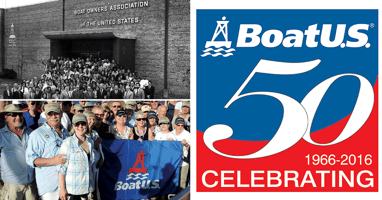Do you stay traditional and name your boat after a sweetheart? If you've been jilted, do you name your boat something bitter as a form of...
Manufacturer’s suggested retail price (MSRP) is the first consideration. But how much does owning a boat cost? Here are some of the necessary investments you'll face throughout boat ownership.
1. Gas and Operation Costs
Your dream boat will require fuel and upkeep, including regular or annual maintenance. Even if you go green and opt for an electric-propulsion alternative (as opposed to a gasoline-powered engine)—electric power from from Pure Watercraft, Vision Marine Technologies, Ingenity, ePropulsion or others—you’ll need enough battery power for your time on the water, which adds cost to the propulsion package.
Your gas and oil or battery power needs will depend on the size and style of propulsion on the boat’s transom and your frequency of use. (New boat engines are 4-strokes, so are more fuel efficient and cleaner than boat engines of old, by the way.) All engines will need some investment in periodic professional maintenance, too.
Ask marine dealers for the estimated costs of operation or talk with experienced boaters, and factor these into your boat-ownership budget.

2. Winterization and Storage Costs
Winterizing a boat involves hauling the boat out of the water, draining plumbing systems and fluids, adding antifreeze, shrink-wrapping the hull, and storing the boat for the off-season indoors or outdoors.
If you plan to boat in warm or temperate climes throughout the year, you may not need to winterize your boat. However, look into your options for storage in case of bad weather or a typhoon or hurricane—and do this well before a weather warning!
If you do need to winterize your boat, take some advice from Discover Boating: storage costs are based on the size of the boat and can run between $50 and $200 per foot indoors for rack storage (the boat is placed up on a rack via a forklift) and $20 to $50 per foot outdoors in a boat yard, per season. You’ll also need to investigate maintenance for winterization and shrink-wrapping coverage of the boat, the cost of which is based on the size of the boat.
 3. Docking and Moorage Costs
3. Docking and Moorage Costs
You need to park your boat somewhere—preferably somewhere safe, secure, and convenient for embarking and disembarking. If you live on the water, perhaps you can arrange to have your own dock or boathouse. Or, depending on the size and style of your boat, maybe you can trailer the boat to a launch site.
Other in-water options are mooring or docking your boat at a marina, for which you’ll likely have to sign a contract and pay a monthly or annual fee. You may also be charged for the electric hookup, freshwater for cleaning, and more. Dry storage, in which the boat is pulled from the water and put up on a rack until you notify the marina of an upcoming trip and they retrieve the boat, is a nice option for keeping the boat hull cleaner than if it sits in the water.
 4. Trailer and Tow Vehicle Costs
4. Trailer and Tow Vehicle Costs
You’ll inevitably have to move your boat on land, for which you’ll need a trailer. At the time of purchase, ask about a boat-and-trailer package; that will almost certainly be more affordable than buying a separate trailer.
You’ll also need to register the trailer in your state (every state is different, but a couple hundred dollars should be ballpark).
 5. Navigation and Safety Equipment Costs
5. Navigation and Safety Equipment Costs
In your boating life, you must be prepared for the unexpected—such as an onboard fire or a man-overboard situation. You need U.S. Coast Guard approved flotation devices aboard for each passenger and a type-IV throwable cushion on boats larger than 16 feet, at least one fire extinguisher, flares or visual distress signals, an EPIRB device to alert search-and-rescue services, and consider an MOB hookup that attaches to the throttle so if the pilot goes overboard, the boat’s power cuts out. Paddles, an anchor, flashlight, and bailing pail are other onboard needs.
Today, you can get navigation electronics with chart plotters, GPS, and sonar readings for depth and to detect obstacles. Proven brands include Garmin, Simrad, Lowrance, and Humminbird. Be prepared to invest from $500 to $2,000 per unit, with installation costing a few dollars more (if you’re not a DIYer). You’ll also want a VHF radio, in addition to your cell phone.
 6. Boat Insurance Cost
6. Boat Insurance Cost
All insurance is peace-of-mind against damage and the unforeseen, and you’ll want coverage on your boat—and you may be required to have proof of insurance if you dock or moor at a marina.
Generally, insurance is based on the size of your boat and its features; most recreational boats will be in the $250 to $500 range annually, which should include coverage on the trailer.
Industry experts often say insurance rates average about 1.5 percent of the boat’s insured value. In other words, a $30,000 boat would cost about $450 to insure. Rates are higher in hurricane zones. Talk to an insurance agent or broker for estimates based on the boat you plan to purchase.
 7. Registration, Licensing, and Certification Costs
7. Registration, Licensing, and Certification Costs
All U.S. states require registrations for motorboats, and fees vary. Once the boat is registered, you’ll be issued identification numbers that you must affix to the boat hull, reading from left to right, with the state’s validation sticker visible.
Although in the U.S. you as the owner won’t need a license like you do a car driver’s license, it’s your obligation to learn and know “rules of the road,” as boating operation and navigation is called. About 70 percent of U.S. states do require a boater-education credential. Find out the requirements where you’ll operate your boat.
If you’ll operate the boat in Canada, you will need proof of competency, the most common form of which is earning a Pleasure Craft Operator Card.
Keep in mind—boater safety courses are fun in and of themselves, and you want to be a competent and safe captain anytime you launch your boat.
 8. Pre-purchase Survey and Inspection Costs
8. Pre-purchase Survey and Inspection Costs
The boating world has experts known as marine surveyors, accredited professionals who inspect your boat, pre-purchase, for any potential problems.
They will also give you a valuation of the boat. Such surveys are optional; however, an insurance company usually requires such a survey before finalizing a policy and underwriting the vessel.
Count on a marine surveyor to charge about $20 per foot based on the boat’s length overall (called LOA). So a 30-foot boat might cost $600 to inspect.
Ask around for recommendations for a good surveyor in your area, or check out the American Boat and Yacht Council’s website for a list of marine surveyors.
If you’re in the market for a used boat, the Marine Retailers Association of the Americas (MRAA) late last year launched its Pre-owned Certified Boat Program, which gives prospective buyers an audited opinion on the condition and value of the boat. Learn more here. 
9. Boat Taxes
Your boat is personal property, which means it will probably be taxed in your state of residence and possibly locally. Unless you live in one of the handful of U.S. states without sales tax, you’ll have to pay state sales tax on the purchase of your boat. Some states have a use tax for boating.
Taxes on boat fuel (and fishing tackle and fishing-license fees) go toward the federal Sport Fish Restoration and Boating Trust Fund, which preserves and protects fishing and boating habitat to the tune of hundreds of millions of dollars annually. It’s a true example of a “user pays/user benefits” tax.
Check your state regulations to know which taxes you might be facing when you become a boat owner; a marine dealer can also answer questions.
 10. Towing Service Membership Fees
10. Towing Service Membership Fees
The day may come when you need a tow on the water. This may be no fault of yours—engines break down, batteries drain, or sometimes a boat operator forgets to fill up the gas tank.
When the boat’s engine won’t run for whatever reason, it’s not safe (and might be illegal) to abandon your vessel and swim for shore.
The good news is that you can enroll in a membership with BoatUS or SeaTow, and they’ll come to your aid. A membership with these organizations is also easier on the wallet than taking your chances.
Both SeaTow’s and BoatUS's Gold memberships are $200, which provide 24/7 assistance.
By comparison, independent tow vessels may charge in the range of $1,000 per event, even more if you’re grounded and need to be pulled free.
 11. Warranty Expenses
11. Warranty Expenses
Your boat is driven by an engine and has electrical circuitry powering the running lights and electronics and plumbing (if an option) and bilge system on the boat, so it might be worth considering extended warranties offered on new models.
But you’ll want to read the warranty offer closely, so you know what’s covered by a standard warranty and what peace-of-mind the extended warranty guarantees.
 12. Depreciation Costs
12. Depreciation Costs
Read up on resale value of the boat brands you’re interested in—some brands hold value better than others. Also, the propulsion on the boat can make a difference in valuation. A new outboard, such as a 600-hp Mercury Verado, is state-of-the-art and may hold its value better than a lesser-horsepower engine from another manufacturer.
Other features on your boat—a livewell and plumbing system, electronics, a bathroom or head, a cutty or sleeper cabin, and the like—can increase the boat’s value and mask overall depreciation.
The same as car ownership, if you’re financing the boat, pay particular attention to the potential resale price—you don’t want to end up underwater on your boat’s purchase price.
 13. Purchase Price
13. Purchase Price
Now let’s get down to brass tacks: What are some MSRPs of various boats? For example, what’s the cost of a pontoon boat?

Generally, a smaller pontoon with a modest-horsepower outboard may start around $20,000, while luxury or “tritoon” boats with lots of features such as those found on hulls from Bennington or Manitou can be $100,000 or more.
How about a fishing boat, such as an aluminum Lund, a popular boat in the Midwest because its design can handle big-water weather conditions? You can start with a Lund 1650 Angler for about $14,000 or an 1875 Crossover XS for about $40,000 up to $85,000 for a Lund 2075 Pro-V (below).  A well-equipped MasterCraft wake-and-ski boat comes in around $90,000. A new Boston Whaler Dauntless 270 bay boat (shown below), fully equipped for fishing and family recreation with Mercury outboard engines and a trailer, might run in the range of $300,000.
A well-equipped MasterCraft wake-and-ski boat comes in around $90,000. A new Boston Whaler Dauntless 270 bay boat (shown below), fully equipped for fishing and family recreation with Mercury outboard engines and a trailer, might run in the range of $300,000.
 It depends on size, propulsion, and features. Click here for the helpful boat-finder from Discover Boating.
It depends on size, propulsion, and features. Click here for the helpful boat-finder from Discover Boating.
To build a private dock at your waterfront home, add another $15,000 for the dock and $3,000 to $20,000 for a boat lift. Comparatively, a marina slip or mooring might be a less-expensive option.
Boat Cost FAQS
What is the annual cost of owning a boat?
Firms such as LendingTree suggest that the annual cost of owning a boat is about equal to what you paid for the boat, engine, and trailer (if you have one). So a $20,000 boat may lead to overall investment of $20,000 amortized over the year, once you factor in gas, maintenance, storage, mooring or renting a boat slip at a marina, and onboard extras. That will be far less if you trailer the boat or have your own dock and storage.
How much does it cost to maintain a boat?
The answer depends on the size and style of your boat, what propulsion you have (a 4-stroke gasoline engine or an electric propulsion system?), where you keep the boat, and how you routinely care for the engine, electronics, and the boat hull’s interior and exterior. According to Discover Boating, generally speaking, overall annual maintenance on a boat should not exceed 10 percent of its cost.
What financing options are available?
Similar to the purchase on an automobile, you can usually get dealer financing or financing through a bank or financial institution. Or you can always pay cash.
Is owning a boat worth it?
Yes! A boat is literally your vessel to fun and adventure, to relaxation, to memories with family and friends—to a lifestyle shared by other like-minded people who love the outdoors.

Ready to purchase your boat?
As hundreds of thousands of Americans concluded since the start of the global pandemic in 2020, boat ownership is a passageway to freedom and an incomparable way to enjoy solitude and lasting memories with friends and family.
Know that researching the purchase price of a boat package is the first step in the process, and you’ll need to plan a monthly or yearly budget for fuel, upkeep, maintenance, storage, and more.
And once you make the plunge into boat ownership, rely on Dockwa to help you find your marina boat slip or mooring.
Be sure to check out our other blog posts to get an inside look at our favorite destinations, marinas, and tips for boaters. Join the conversation on Flipboard, Facebook, Twitter, and Instagram.





